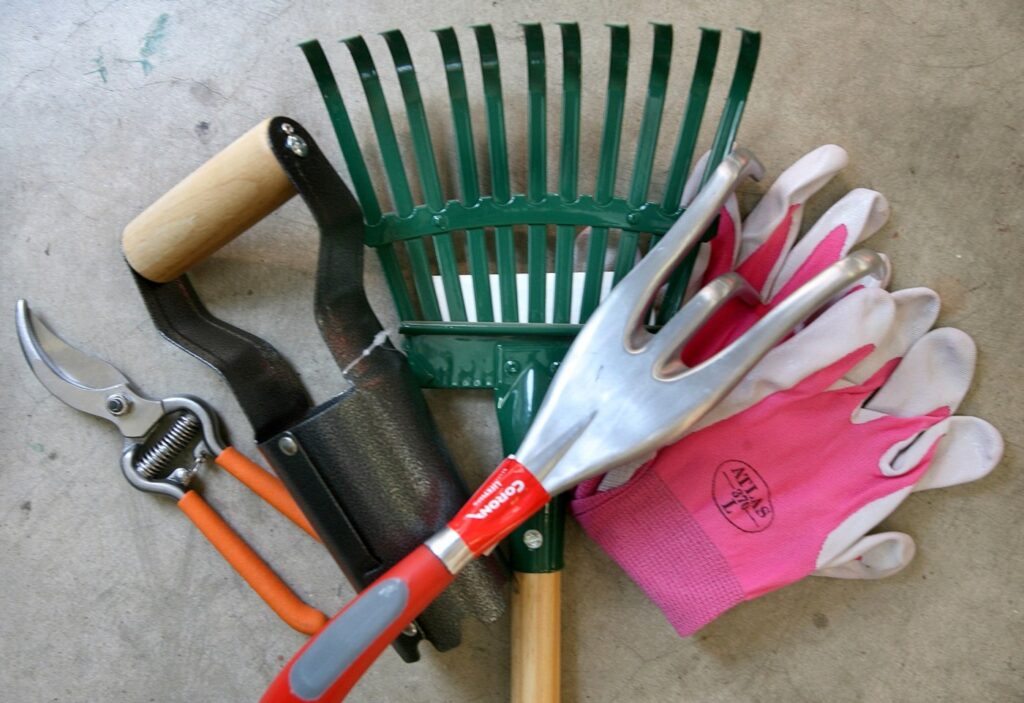
Most gardeners would cite their pruners as their favorite tool, probably because pruners are one of our most utilized tools. I never go into my garden without my pruners. Interestingly, my informal survey of master gardeners, members of the Marin Garden Club and friends yielded four different brands.
Not surprisingly, several people liked a couple of brands of Japanese pruners. The Japanese are known for their long-lasting tools. If you haven’t been there, check out the Japanese tool shop Hida Tool & Hardware Co. in Berkeley. I bought a pole pruner there a couple of decades ago, and someone dropped it and somehow broke a part, which they promptly fixed for $15. There’s also a wonderful Japanese hardware store Soko Hardware in Japantown.
Many gardeners use Swiss pruners, which are pretty much the industry standard because of their wide range of sizes and replaceable parts. One friend told me that she uses a little pink pruner she paid $1 dollar for. She lives in a condo but has a large deck with huge pots of succulents, which certainly need occasional pruning, along with indoor plants.
I keep an extra pruner in my car along with a bucket and a large bottle of water in case I happen to buy flowers and have other errands to run. You never know when you might find nice flowers.
A collection of hand tools that can be used in the garden. (Diane Lynch/Marin Master Gardeners)
A keen gardener I know swears by cardboard to wipe out small patches of weeds. She cuts weeds to the ground, covers them with several cardboard layers, wetting them down to conform to the terrain, and covers them with mulch. She also loves a little hand rake that acts like an extension of her arm to reach under plants for cleanup and to spread mulch.
Another avid gardener always carries her pruners and hori hori knife, which are handy for cutting errant roots, scraping, digging and planting bulbs and other plants. The Dutch are known for their wonderful array of small garden tools, including trowels with specific purposes and hori hori knives.
I’ve talked to a couple of people recently who have small battery-powered chain saws. One friend, whom I didn’t imagine using a chain saw, said she loves it because it’s quiet, lightweight and will cut branches up to about 3 inches.
Another friend told me that he uses a post-hole digger for planting small plants. Genius! I wish I’d asked him earlier, but this is a great way to plant tomato plants after removing the lower leaves. Tomatoes are one of the few plants that will sprout roots along the stem, so you should cut the lowest leaves and plant them deep, which allows them to conserve water and develop a large root system.
The three-legged orchard ladder is much more stable than the four-legged variety. (Diane Lynch/Marin Master Gardeners)
Here’s another great idea. As we age, our skin sometimes gets thin and fragile. A garden club friend with a huge garden in Ross loves her shin guards from any sports store, which protect her legs from nasty bruises and cuts.
I have a small tool with a double-sided head: a chopping blade on one side and a short little rake/cultivator on the other. It’s great for mixing compost into pots and other small chores.
A couple of other gardeners mentioned Grampa’s Weeder, a device that grabs the weed as you step on the little pedal that wrenches it out.
“Very satisfying,” one commented.
Loppers are a favorite tool of many gardeners and several favor the lightweight bypass ones. Older loppers are great for strong people, but the wood handles make them quite heavy. One person told me she loves to prune with her loppers and finds it “almost therapeutic.”
No one mentioned the orchard ladder, so I’ll put in a pitch for this essential tool if you prune above your head. Three legs make it sit level even on uneven or slightly sloped terrain. Mine are old wood ones, but there are newer aluminum ones that look pretty nifty. The ladder is probably the most dangerous tool we use in the garden. Years ago, I heard about someone’s mother who fell off a ladder and spent an entire year in the hospital after tearing her heart. A friend recently spent several weeks in the hospital and rehab after a nasty fall.
Remember to keep your tools clean, sharp and oiled. They’ll last a long time and serve you well.
Sponsored by UC Cooperative Extension, the University of California Marin Master Gardeners provides science- and research-based information for Marin home gardeners. Email questions to [email protected]. Attach photos for inquiries about plant pests or diseases. Please call 415-473-4910 to see when a master gardener will be at the office or drop off samples 24/7 in the sample box outside the office. To attend a gardening workshop or subscribe to Leaflet, a free quarterly e-newsletter, go to marinmg.ucanr.edu.
